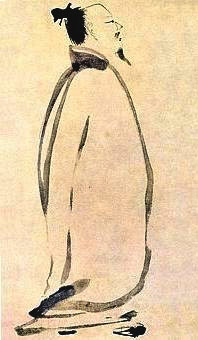 Li Bai (701-762) was one of the greatest poets of the Tang Dynasty. The Tang era was a golden age of Chinese poetry, and Li Bai’s works made up a major part of this. A large number of poems from this period still survive today, they have been translated into many languages all over the world. Li Bai is one of the most famous and well respected poets of the era.
Li Bai (701-762) was one of the greatest poets of the Tang Dynasty. The Tang era was a golden age of Chinese poetry, and Li Bai’s works made up a major part of this. A large number of poems from this period still survive today, they have been translated into many languages all over the world. Li Bai is one of the most famous and well respected poets of the era.
The Life
Li Bai was born in 701, the exact location of his birth is unknown but it is believed to be in Central Asia. Some believe he was born in Suiye which is now Kyrgyzstan. There is a story that his mother had a dream of a falling white star and then fell pregnant with him. This gave rise to a myth that he was a fallen immortal who had come to Earth.
When Li Bai was a young child his family was moved to Sichuan in secret by his father. He remained here until his mid-twenties. His memoirs suggest that he was a gifted swordsman and martial artist. He claimed to have killed several men by the time he was twenty.
Upon reaching his mid-twenties he set sail on Yangzi River and began life as a wanderer. He married the grand-daughter of a former ruler of China, gave away much of his wealth and met famous people. He became a celebrity himself and continued to travel. He joined up with a group of other poets who also enjoyed writing about and drinking wine.
Li Bai was considered a genius and became a friend and adviser to the Emperor. When war broke out and the Emperor was removed a power vacuum was created. Li Bai made an attempt to seize power, he was unsuccessful and sentenced to death. A general who Li Bai had befriended and helped many years earlier intervened on his behalf and he was exiled instead.
He continued his nomadic lifestyle but traveled much shorter distances. He was to be named the Registrar of the Left Commandant’s office by the new Emperor in 762 but he died before news of this reached him. There are differing accounts of his death. It is suggested that it is likely that his nomadic existence and heavy drinking took a toll on his body which caused death by natural causes. A more romantic story suggests that he died whilst trying to embrace the reflection of the moon in a lake. This is used in Chinese culture as a caution against illusions.
Surviving Work
The Tang Dynasty spanned nearly 300 years in ancient China. During the period between 618 AD and 907 AD over 50,000 poems where produced by over 2000 different poets. Li Bai is credited as the author of over 1000 of these poems. A lot of his work has been preserved and survives today, although it is not known if it has been edited or otherwise altered to fit in with cultural, political and social norms of subsequent times. If it has been edited it is not known to what extent. Li Bai was viewed as controversial by some, he wrote graphically about drunkenness. He often championed drunkenness and glorified it as a lifestyle. Many of his poems were written about Chinese wine. He also glorified his wandering lifestyle. These topics would have made his poems very controversial at the time and would be considered inappropriate by some, even today.
If his work has been edited since it was first written it should not diminish its importance or prevent us from enjoying his writings. A parallel can be found in modern day film making. Many movies are censored and edited by studios but this does not prevent us enjoying them. Li Bai’s surviving works remain an important part of Chinese culture.
There is only one known piece of work that survives today which was written by Li Bai’s own hand. This surviving poem is named Shangyangtai which means Going Up to the Sun Terrace. This important piece shows us that Li Bai was a gifted calligrapher. This manuscript can be found in Beijing, China at the Palace Museum.
The Style
As a poet, Li Bai often looked back to the past for inspiration. He very rarely wrote about the future. The celebration of alcoholic beverages and a drunken nomadic lifestyle was not the only reason that his work was considered to be controversial. He often wrote poems from different perspectives and viewpoints, including from the perspectives of women. It was considered to be inappropriate at the time for a man to write with the viewpoint of a woman.
He also broke many established rules of poetry at the time, and this was also seen as controversial by many people. When placed in context we can understand why this was so. Artists often will push the boundaries of what is acceptable, a common occurrence among painters in the last 300 years and musicians and film-makers today. Li Bai pushed the boundaries of what was acceptable at the time. He is remembered as a gifted man who led an extraordinary life and left behind a legacy of over 1000 great works of Chinese literature.